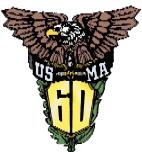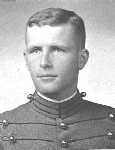

|


|
|
|
Richard Klemm Boyd Jr. Cullum No. 23117 Died 26 October 1967 in Vietnam, aged 29 years. Interment: West Point Cemetery, West Point, New York Richard Klemm Boyd Jr. was born at Fort Benning,
Georgia, on 9 April 1938, the only son and second child of Colonel and
Mrs. Richard Klemm Boyd (USMA ’31). He thoroughly enjoyed the full
life of an Army brat, eagerly looking forward to seeing new places, making
new friends, and, above all, meeting and coping with new challenges.
His father’s assignments enabled him to attend school in Germany as well
as at Fort Benning, Fort Monroe, and Carlisle Barracks. During these
formative years, Dick was an enthusiastic participant in the Scouting Program
achieving the rank of Eagle Scout and being inducted into the Order of
the Arrow at age thirteen.
Having successfully won a Presidential appointment for the Class of 1960, Dick entered the Military Academy on the third of July 1956. This was one of the most important days in his life – the fulfillment of his boyhood dreams. He often reminisced about the thrill it was for him to be sworn in as a member of the Long Gray Line following in the footsteps of his father; his paternal grandfather, Captain Charles T. Boyd, Class of 1896, killed in action in 1916, during the American expedition against Pancho Villa; and his maternal grandfather, Major General Ralph M. Pennell, Class of 1906, who served as Commandant of the Artillery Center at Fort Sill and following his retirement, as President of the Fort Sill National Bank. In addition to his father and two grandfathers, a great uncle, Colonel Karl D. Klemm, Class of 1905, and two uncles, the late Colonel Robert Pennell, Class of 1939, and Major General Osmund A. Leahy, Class of 1940, also preceded him as members of the Corps. Dick’s indomitable spirit and quick wit emerged during Beast Barracks. He became a source of inspiration to those of us who were not so sure that there were better days ahead. He stood tall and proud, his tight-lipped smile, often misinterpreted, reflecting the confidence of a man who knew where he was and where he was going. During his four years as a Cadet, he accepted academics as a necessary means to an important end. He concentrated on tactics, became fluent in French, and availed himself of every opportunity to pursue his favorite avocations: skiing, sailing and golf. His agility on the lacrosse field and the wrestling mat were significant contributions to D-2’s perennial possession of the Banker’s Trophy. His leadership ability resulted in his being selected as a Corporal during “Cow Year” and as a Lieutenant, the Battalion Training Officer, First Class Year. Following his graduation on 8 June 1960, he returned to his birthplace as an Infantry Second Lieutenant to attend his Branch Orientation Course and enhance his qualifications as an Infantryman by completing the Airborne and Ranger Courses prior to joining the 1st Battle Group, 7th Infantry. While in Germany, he volunteered for duty in South Vietnam where he served in 1963 and 1964 as an advisor to the South Vietnamese Army in the Mekong Delta and in J3, MACV. His fluency in French enabled him to gain quick acceptance and greatly enhanced his effectiveness during these early years of the advisory effort. For this service in Vietnam, he was awarded the Bronze Star Medal and the Combat Infantryman Badge. Upon returning to CONUS, he was assigned to the 5th Infantry Division (Mechanized) at Fort Carson, where he commanded Headquarters Company, 1st Battalion, 61st Infantry. During this assignment he began work toward a Master’s Degree in Political Science at the University of Colorado, attending class in the evening. He became particularly interested in the governments of Asia and Africa. While participating in DESERT STRIKE, he became aware of the potential advantages of employing mechanized forces in Vietnam. His outstanding performance of duty as a company commander led to his selection to be the Aide-de-Camp to Major General Joseph E. Bastion Jr., Deputy Commanding General of 5th Army. In that job, he particularly appreciated the change to meet young National Guard officers. While attending the Infantry Officer Advanced Class, he again volunteered for duty in Vietnam. He joined the 1st Brigade of the 101st Airborne Division on 29 June 1967. Less than two months later, he assumed command of Company B, 2d Battalion (Airborne), 502d Infantry, on a morning following a fierce all-night battle with North Vietnamese regulars. Under Dick’s inspirational leadership this company would soon see more sharp battles. During the following weeks of continual short contacts with enemy elements, a bond of love and devotion grew between the men of Battling Bravo and their new company commander. From the platoon leaders down to newly assigned privates, everyone felt that Dick was a professional soldier – skilled, courageous, tough when necessary, and completely dedicated to his men and the tasks at hand. Some voiced their deep respect for him in conversations with their friends: others simply followed him in a manner indicative of great respect. They gave him their very best, and he more than reciprocated. Under Dick’s command, a new spirit was born in B Company. On 2 October 1967, on a search and destroy mission his company became decisively engaged with two enemy companies occupying fortified positions. For his exceptionally valorous action that day, Dick was awarded the Silver Star. The citation accompanying this award, presented posthumously to his parents, reads in part: “As the point platoon assaulted the initial enemy bunker system, it was pinned down. Captain Boyd directed that two platoons move forward to assist the pinned down platoon. Personally leading the maneuvering force from the point element, he started across an exposed area and was immediately brought under intense automatic weapons, rifle, and rocket fire. Observing that two of his men had been seriously wounded and were lying in an exposed area of hostile fire, Captain Boyd immediately, and with complete disregard for his own safety, rushed forward through the intense fire and pulled the men to safety. Captain Boyd then directed that one platoon give covering fire for the maneuvering element in order to withdraw its casualties and disengage the enemy to allow supporting artillery fire to be called in. Dazed by enemy rocket fire which wounded four, Captain Boyd regained his feet and, still exposed to the enemy fire, moved among his men’s positions giving them encouragement and directing their fire. Captain Boyd remained continuously exposed until his wounded had been removed to safety.” The outstanding leadership and courage displayed by Dick that day were characteristic of both his high sense of duty and his respect and regard for those who served under him. His actions enabled B Company to deal effectively with a numerically superior enemy force while sustaining minimum casualties. Three short weeks later, while on a perimeter defense near Chu Lai, Dick’s company was subjected to an intense enemy attack. During this attack, an enemy grenade fell at his feet inflicting multiple metal fragment wounds. On 26 October 1967, Dick died of these wounds. He was posthumously promoted to Major. On 4 November, a rainy Saturday morning,
Dick was buried with full military honors at his Alma Mater in the presence
of the family he loved so dearly and many of his classmates and friends.
Although our sorrow at the loss of this dedicated soldier is great, his
generous spirit and will to win the battles of life live on in all who
knew him. The impressions he made are indelible. All who came
into contact with him are fortified by their memory of his buoyant love
of life, his devotion to duty and his abiding concern for the welfare and
happiness of his fellow man. He truly lived “above the common level
of life” and left us with an ideal toward which all should strive.
In addition to his parents, who reside in Gibson Island, Maryland, Dick was survived by his sister, Barbara Beatty, of Washington, D.C., Major General Pennell, and his paternal grandmother, Mrs. Richard H. Hawkins, of Baltimore, Maryland. -A Roommate |